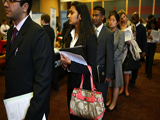Discrimination Against The Unemployed
Post Views 4
With high unemployment persisting more than four years after the start of the Great Recession, and three years after it was officially declared over; there are many who still say they face work discrimination. Nearly 13 million Americans, or 8.3 percent, were unemployed in February, the U.S. Department of Labor says.
The employer concerned said she would not consider applicants who were unemployed for more than six months.
“What they don’t consider is that these are not normal times,” said Chesney-Offutt.
While employers have stepped up hiring in recent months, layoffs have slowed and the unemployment rate has begun to fall more quickly, it has not been a been a boon to everyone without a job. In February, 3.5% of the U.S. work force was unemployed for more than six months, compared with 4.0% in February of 2010, a smaller decline than in the overall jobless rate. The average unemployed worker has been jobless for 40 weeks, a mark that has barely budged in the past six months.
As of January, California, Connecticut Florida, Iowa, Michigan, Minnesota, Nebraska, New York, Ohio, Pennsylvania, South Dakota and Tennessee were considering legislation to prohibit employers from discriminating against the unemployed in help-wanted ads or in direct hiring or in screenings by employment agencies, according to the National Conference of State Legislatures.
Employers typically would face fines if found violating the law. The Oregon Legislature, for example, voted last month to fine employers $1,000 if they post a job ad telling unemployed workers to not apply. The bill is awaiting action by the governor.
Some personnel managers, however, say evidence of discrimination is sketchy and that hiring decisions are based on a host of subjective reasons that defy remedies imposed by laws. “There’s much more subliminal discrimination against the unemployed that’s hard to document,” said Lynne Sarikas, director of the MBA Career Center at Northeastern University’s College of Business Administration. “Hiring is an art, not a science. You rely on a gut reaction.”
Employees suspecting that an unemployed applicant seeking an available job for the wrong reasons, maybe coming across as too urgent or desperate for work, or a manager getting the vibe that they’ll take anything to get a job and if something better comes along they’re out the door; are typical examples.
Terri Michaels, who manages a Hartford employment firm that primarily staffs temporary employees, criticized hiring practices that screen out unemployed job seekers. Some employers have an unspoken policy against hiring applicants who’ve been out of work for two years because their looking for stability and recent references.
“Employers generally expect job candidates — even while unemployed — to show they did some work such as volunteering or working temporary jobs”, Michaels said. “People who did not work in any capacity, didn’t do anything are not as desirable to prospective employers,” Michaels said. “One has to question, is that discriminatory? I don’t know.”
Discrimination Against The Unemployed by Harrison Barnes


 The Most Popular 20 Employer Articles for Gig in 2015
The Most Popular 20 Employer Articles for Gig in 2015  Telecommuting Doesn’t Work for All Jobs
Telecommuting Doesn’t Work for All Jobs  5 Ways You Can Hire and Keep the Best Employees for Your Company
5 Ways You Can Hire and Keep the Best Employees for Your Company  The New Trend of Defamation Lawsuits
The New Trend of Defamation Lawsuits  6 Ways to Make Your Employees Happier
6 Ways to Make Your Employees Happier  Top 4 Most Effective Management Styles & How to Use Them
Top 4 Most Effective Management Styles & How to Use Them  10 Things to Look for When Hiring
10 Things to Look for When Hiring  What Does It Actually Cost to Hire a New Employee?
What Does It Actually Cost to Hire a New Employee?